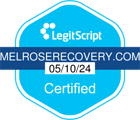Every addiction struggle is different, requiring unique treatment approaches depending on your age, severity, and other personal factors. That’s why it’s vital to understand different types of alcoholics and which category you or a loved one falls under. Rest assured, if you aren’t sure which type you are, our medical assessment team ensures accurate diagnosis to get you to the best treatment for you. Melrose Recovery offers alcohol rehab near Los Angeles, which includes detox and residential treatment. With those variables in mind, here is everything you need to know about the different alcoholic types and their correlation with proper treatment.
What are the Different Types of Alcoholics
Each individual struggling with alcohol dependency has unique needs defined by their alcoholic distinction. The details below elaborate on the different types of alcoholism and the unique dangers they pose.
Young adult alcoholism consists of over thirty-one percent of alcohol dependency cases. That’s just one example of why age matters when it comes to assessing alcoholic diagnosis and treatment placement. What makes young adult dependency dangerous and different from other alcoholism classifications is most of these drinkers binge drink, accounting for over seventy percent of drinking sessions in young adults. While most in this classification are not daily drinkers, the excessive drinking habits within these age ranges exhibit the inability to moderate your sessions.
A functional alcoholic is the most difficult to spot because they can perform daily tasks, routines, and work duties with efficient ease. In many cases, they can perform these duties even better than when they are sober. Most may even exhibit limited or zero slurred speech. In perspective, more than sixty percent of functioning alcoholics maintain a full-time job, many unbeknownst to their coworkers or employees. Disconcertingly, according to the National Institute of Health, fewer than twenty percent of functioning alcoholics seek professional treatment, indicating the majority fail or refuse to recognize their drinking problem. In addition, these types of alcoholics account for nearly twenty percent of alcohol addictions.
Antisocial alcoholic personalities are unique from others due to the impulsivity and lack of remorse associated with these types of alcoholics. Therefore, many of these alcohol dependents have no desire to recover, oftentimes at the expense of their relationships and jobs. Similar to young adult alcoholism, there is also a higher degree of recklessness associated with antisocial alcohol dependency. Even worse, alcohol can exacerbate antisocial traits or tendencies, especially given any underlying mental health conditions. In addition to the aforementioned traits, antisocial drinkers are more prone to addiction, deeper depression, and worsening preexisting mental health conditions.
These types of alcoholics began drinking very young, therefore making alcohol a part of their routine at a very young age. Thus, intermediate familial-based alcoholics have more ingrained drinking habits, often stemming from close relatives considering almost half of these drinkers possess close alcoholic family members. Consequently, intermediate familial alcoholism requires more hands-on treatment to aid alcoholic impulse removal and replace negative habits with proactive ones.
Chronic alcoholics are the most dangerous types of alcoholics for many obvious reasons. For starters, chronic drinking habits infuse the dangers of binge drinking with daily frequency. This is because chronic drinkers have little to no ability to limit themselves. Like Intermediate Familial drinkers, chronic drinkers often begin drinking at a very young age. As they get older, chronic drinking grows even more frequent, leading to a debilitating quality of life. This is supported by studies that reveal chronic drinkers to have a divorce rate exceeding twenty-five percent and an employment rate below forty-four percent.
Common Characteristics of Different Alcoholic Types
While every case of alcohol addiction is unique, there are identifiable behavioral traits that make them distinct from one another. The following traits help you distinguish between the aforementioned different types of alcohol addiction. Bear in mind that possessing the following traits does not always mean a specific type of alcoholism and should not serve as a self-diagnosis tool. All of the traits to be mentioned should be confirmed and assessed by a treatment assessment specialist.

Binge drinking, defined by the CDC as five or more drinks in men or four or more for women, is a common characteristic of young adult alcoholism. Those who fall under this type of alcoholism are at high risk of alcohol poisoning which could have fatal consequences. If you or someone you love are known to drink within the realm considered excessive, seek help today.
Individuals with a drinking habit in conjunction with preexisting mental health conditions are indicative of an Intermediate Familial Alcoholic. Any underlying mental health conditions can exacerbate substance abuse such as alcohol and should be met with swift treatment action that includes addiction therapy. Adversely, substance abuse can also cause a variety of mental health problems, some of which Reach out to a treatment specialist to determine whether you may possess unknown mental health conditions that coincide with drinking.
Alcohol-induced reckless behavior and dangerous levels of alcohol intake are tell-tale signs of antisocial alcoholism. Most antisocial alcoholics possess an underlying personality disorder of some sort. More specific examples of reckless behavior include putting the safety of themselves or others at risk, criminal acts, and lack of conscience. Reckless behavior can also lead to lethal levels of drinking within a session, unbeknownst or uncaring to the consumer.
Functioning alcoholics often exhume the stench of alcohol, yet without much seeming impairment or slurred speech. This is why it is so difficult to identify a functioning alcoholic when the stench of alcohol is not present. Keep an eye out for bloodshot eyes or other physical or behavioral red flags to pinpoint a functioning alcoholic.
Anybody exhibiting the inability to stop drinking, whether in a single session or daily, may have a chronic drinking disorder. This means despite their attempts or claims to reduce or eliminate drinking habits, they have no control over their alcohol consumption. If you or a loved one exhibits this sign of a chronic drinking problem, time is of the essence. Reach out to our caring team of recovery experts today to stop before it’s too late.
Most Effective Treatments for Each Type of Alcohol Dependency
Age, duration, and depth of addiction all play a part in which treatment suits your recovery needs. In addition, your unique struggles are also factored into the treatment assessment process. All factors considered, here are the most effective and preferred treatments for each type of alcoholic classification.
Medical-based treatment such as medical assistance programs or one-on-one therapy programs are the most effective treatments for antisocial alcoholics. These personalized programs afford individuals the opportunity to mentally and physically cleanse themselves by providing proactive vents for their struggles. Our top-notch rehab methods include full-proof relapse prevention techniques through our strong support system to help stay on track.
Alcohol-dependent sufferers in this category often prefer private rehab treatment offered by their healthcare provider. Because personal healthcare providers are most familiar with family and medical background, it’s also the most efficient to meet their needs. Personal healthcare-supported recovery usually consists of regionally-supported healthcare facilities and services. These services and programs vary depending on individual coverage so check with your personal coverage provider for more details. You can also speak to Melrose Recovery specialists to learn how we work with healthcare providers to find you the best treatment.
Most heavily addicted alcohol drinkers and chronic abusers require medical detoxification programs to fully recover from their addiction. That’s because chronic drinkers develop degrees of mental or physical dependency that make stopping a painful process without medical detox. Our detox programs are meticulously designed to remove associated cravings and minimize withdrawal symptoms associated with alcohol dependency.
Young adult alcoholics are among the most difficult to treat because only roughly eight percent of this classification seek rehab. However, there is a wide range of rehab facilities and treatment programs specifically geared towards young adults. The majority of these programs consist of 12-step programs and private service practices that shed light on the nature of their drinking problem. Most importantly, these young adult-based programs establish proactive habits and discipline to help them overcome their struggles.
Since functioning alcoholics predominantly maintain a full-time job, 12-step programs or personal therapy sessions accommodate individuals with a busy work, school, or lifestyle. Bear in mind, that holding down a full-time job doesn’t make the struggles of a functioning alcoholic any less severe. If anything it’s more severe considering the low percentage who seek professional help, making them more susceptible to dangerous health conditions.
Melrose Recovery is Your Key to a Better Quality of Life

Melrose Recovery treatment programs utilize life-changing treatment methods and the utmost care to help you achieve your sobriety dreams. Our unparalleled treatment professionals make your sobriety their prime focus. Together we’ll help you rise from the discouraging trenches of addiction to the freedom-lifting skies of self-sustainable sobriety. Our dedicated treatment team will help you unlock your greatest potential toward a better quality of life free from addiction. Take the plunge and reach out to our sympathetic receptionists to begin your life-changing recovery journey today.









